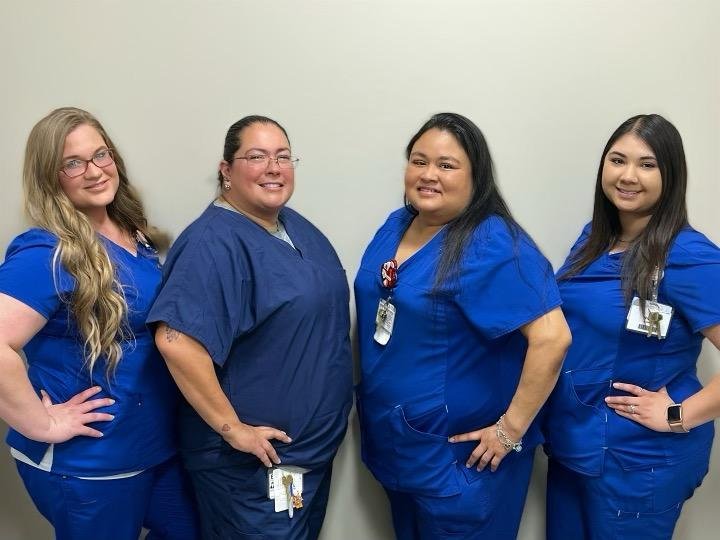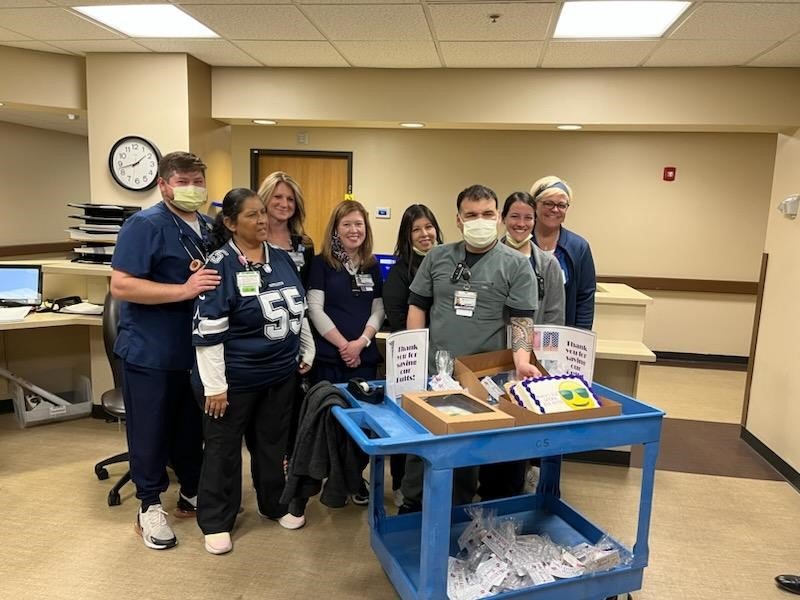Christus Santa Rosa San Antonio Medical Center Inpatient Wound Service Team celebrates Zero Reportables
Christus Santa Rosa Medical Center San Antonio and WoundCentrics had a hospital sponsored celebration event on February 10th to highlight a team achievement of zero reportable wound care events, hospital-acquired pressure injuries (HAPIs) for over 100 days. Christus has contracted WoundCentrics, a wound care management company, to oversee the inpatient skin and wound care program in partnership with the hospital’s staff.
Since the full implementation of the WoundCentrics specialist nursing and provider programs, the hospital’s reportable events, Stage III, Stage IV, and Unstageable pressure ulcers, have fallen to zero reportable events to the controlling agencies that mandate reporting such events. Both the Christus clinical team and the WoundCentrics team share in the success of the Inpatient wound care service delivery of these outstanding results as it takes coordinated efforts to provide these outcomes.
Christus Santa Rosa San Antonio staff helps us celebrate.
Kimberly A. Ford, MBA-HM, BSN, RN, Director of Operations for Inpatient Services for WoundCentrics explained, “Although the concept of our program is built on the foundation of Best Practices for Pressure Injury Prevention and advanced wound care, the implementation and ongoing oversight with the associated culture shifts is where we can work with our hospital partners and create improved outcomes. This makes a difference not only to the care that is provided, but it has an enormous effect on Quality and Patient Safety scores and significant financial benefits by decreasing associated costs by up to 75%. ““The collaborative and proactive support provided by our inpatient program has also been shown to increase satisfaction of the hospital team members, nursing and other ancillary team members, and in turn affects retention. Our experience with wound prevention, early identification, timely interventions and our education program are delivering results at the bedside,” Ford said.
For background, an article published in WoundScource on January 31, 2023, stated:
“The National Quality Forum (NQF) introduced the term never event in the early 2000s, and it refers to a preventable error that may represent fundamental issues with the quality or safety of care within a medical setting.1 This wording was initially selected because these events are situations that should never happen to any patient, such as surgery to the wrong leg or leaving a sponge in a patient after surgery.2 In recent years, the NQF has adopted the term serious reportable events (SREs), but in many instances, the term never event is still used.”
Never Events in Wound Care: In wound care, the concept of a never event is complicated. In 2008, the Centers for Medicare and Medicaid Services (CMS) released a list of facility never events that are not covered under Medicare. Under that list were hospital-acquired stage 3 and 4 pressure injuries, along with unstageable pressure injuries. Several other hospital-acquired conditions are listed, including burns and certain surgical site infections.
For those working in understaffed facilities or with patient populations at a higher risk of such injury, the inclusion of these conditions as never events may have profound consequences. In certain cases, wound care professionals who provide the standard of care or even care that exceeds expectations may receive repercussions when a patient develops a pressure injury. In addition to Medicare not providing coverage for these injuries, clinicians could face legal action from the patient or their family.
WoundCentrics Inpatient Wound Care Service is designed and customized to lead the hospital’s wound care program to provide advanced wound care services that align with the hospital nursing and clinical teams. The program reduces risk, reduces harm events, improves documentation and adherence to standard of care for a first line of defense.
Marcus Gitterle, MD, Chief Medical Officer and co-founder of WoundCentrics said, “I am proud of our team, for helping the Christus Santa Rosa system to achieve such an outstanding level of patient safety. Pressure Injury prevention requires a deeply collaborative culture, and excellent communication, in order to be sustainable. Our “Measurvention” approach is, I feel the only reliable method for prospective prevention of these iatrogenic events, and these results affirm that.”


